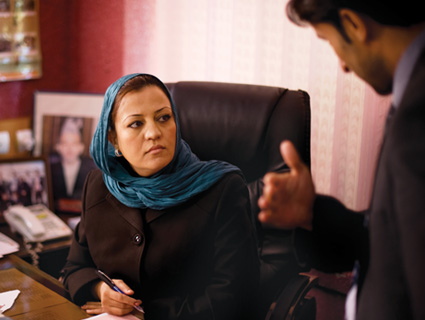
Photographs by Elliott D. Woods
See also: A slideshow of this story that includes interviews with survivors of self-immolation.
A 22-YEAR-OLD WOMAN lies naked on a tile platform. Ninety percent of her body is burned—her skin mottled brown and in places torn open, exposing the white tissue of seared muscle. Nurses bathe her with saline solution. An IV tube drips fluid into her right foot, one of the few unburned places on her body. The odor of her flesh mixes with lingering traces of the cooking fuel she doused herself with.
Shayma Amini, 33, is the head nurse in Herat Regional Hospital’s burn unit, where women from all over western Afghanistan are brought to be treated after self-immolation. A stout woman with a gentle, dutiful gaze, Amini begins wrapping the woman’s body in elastic bandages. Bits of her blackened clothing flit across the floor, spun by the shifting feet of the nurses.
The previous evening, the woman’s father had called her a slut, accusing her of sleeping with a man out of wedlock. He had taken her to a doctor who confirmed his suspicion. Now she would never find a husband. She was worthless to her family. Throughout the night, the woman fumed. In the morning, she stormed upstairs, locked the door behind her, and set herself ablaze. She burned for 20 minutes before her father finally beat down the door. She had not wanted to burn so badly, she told the doctors. I’ll behave better. Let me live. Don’t send the case to the police. It is not my father’s fault.
When Amini finishes encasing her in bandages, the woman looks mummified. The nurses lift her to a gurney and cover her with a piece of green cloth. The aroma of kerosene trails them out of the emergency room and down the hall to the burn ward.
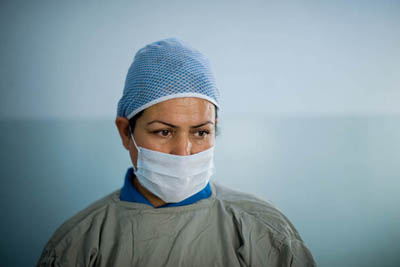 Shayma Amini, 33, is a nurse in a burn unit at Herat Regional Hospital.Amini guesses she’s seen at least a thousand self-immolation cases since she started at the hospital 13 years ago—almost all of them young women seeking to escape abusive marriages (PDF) or the prospect of being turned out onto the streets by men who no longer want them. Women have been beaten—or starved, as a controversial 2009 law (PDF) allows some angry husbands to do. Seeing no escape, they choose to engulf themselves in flames.
Shayma Amini, 33, is a nurse in a burn unit at Herat Regional Hospital.Amini guesses she’s seen at least a thousand self-immolation cases since she started at the hospital 13 years ago—almost all of them young women seeking to escape abusive marriages (PDF) or the prospect of being turned out onto the streets by men who no longer want them. Women have been beaten—or starved, as a controversial 2009 law (PDF) allows some angry husbands to do. Seeing no escape, they choose to engulf themselves in flames.
In the first six months of 2010 alone, the hospital treated 69 cases. At that rate, self-immolations will exceed 2009’s total by 40 to 50 percent. And the hospital staff believes the real number of cases in any given year to be much higher than reported; many victims die before reaching the hospital. Many more refuse to admit to burning themselves. “Numbers are impossible, because so many immolation victims won’t tell the truth,” says Hassina Neekzad, director of the Western Afghanistan Women’s Network. “If they recover, they say it was an accident.” Most lie to authorities, she says, because women become pariahs if they admit to self-immolation; they only confess if they are near death. “Who can hurt them then?” Neekzad says.
Amini attaches the woman to a ’70s-era heart monitor, only to realize it doesn’t work. She finds another from the same era that does. A monotonous beep sounds out the patient’s pulse. The woman rolls her head, watching the activity around her. Her face is swollen to twice its original size. A police investigator with the Family Response Unit, a project launched in 2006 that assigns female police officers to investigate domestic abuse, asks a few questions and jots notes on a clipboard.
The young woman moans and closes her eyes.
Sixteen hours later, her heart monitor goes quiet.
IN JULY 2010, delegates from more than 60 nations and 14 international organizations including the UN converged on Kabul, pledging to tie future aid to demonstrated progress in eradicating corruption and protecting human rights. “Participants reiterated the centrality of women’s rights,” a communiqué (PDF) pronounced. Hamid Karzai’s government was given six months to show it had implemented the National Action Plan for Women and made progress toward enforcing the Elimination of Violence Against Women Law. But what can that mean in a province like Herat, where the Taliban control the hinterlands; where district police, even if they wish to protect women’s rights, are too afraid to enforce the law?
Maria Bashir strides quickly down the hall in a black coat and blue hijab, the click of her heels purposeful on the tile floor. Everywhere in the ancient city of Herat, with its cracked wooden doors and mud-roofed vendor stalls, Bashir is on guard—even here in the courthouse where she serves as the chief prosecutor of the province. Click, click, click, her heels keeping time like a metronome. During the first euphoric days after the Taliban fell—what Bashir recalls as the happiest time of her life, when a future of justice for women seemed within reach—the town elders ordered these corridors inscribed with legal declarations in orange and blue paint:
Ignorance of the law cannot be an excuse for crime.
Any order issued by the prosecutor should be followed by all judicial organizations.
Following the provisions of the law is the duty of every citizen.
No one could have imagined then that the chief prosecutor would one day be this tiny woman, whose sad eyes and pursed lips always make her seem to be biting back tears. Before Bashir’s appointment in September 2006, no Afghan state had ever had a female chief prosecutor. But Bashir had won fame as an assistant prosecutor for her investigation into the death of the young poet Nadia Anjuman. She had charged Anjuman’s husband with murder after he admitted beating her. Anjuman’s friends say he was ashamed of her poetry, some of which described the oppression of Afghan women: I am caged in this corner, full of melancholy and sorrow…my wings are closed and I cannot fly…I am an Afghan woman and I must wail. Though he confessed only to assault—and Anjuman’s death was later classified as suicide—the mere attempt at prosecution was viewed as bold, and Bashir parlayed that into an appointment as chief prosecutor. Her promotion was extolled, particularly by the Bush administration and its allies, as a symbol of a reborn westernizing Afghanistan, where women could aspire to positions they never dared imagine under Taliban rule.
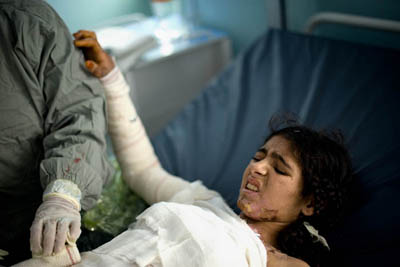 Amini treats Shereen, a teenager who was burned over 45 percent of her body—the result of an accident, she said.Secretary of State Condoleezza Rice flew Bashir to Washington for lunch to honor the progress—though Bashir didn’t quite stick to the script, later telling one reporter that the pace of change in Afghanistan was too slow. “Three years ago, people had a very clear idea of the future for Afghanistan,” she said. “Now we don’t.” The new Afghan constitution (PDF), passed in 2004, provided equal rights for women, but to this day most judges give preeminence to an extremely conservative interpretation of Islamic sharia law. The UN Development Fund for Women (PDF) has found that 70 to 80 percent of Afghan females are forced into marriage—most before the legal age of 16, more than 60 percent (PDF) into physically abusive households. Men take multiple wives, but for women found guilty of sex outside marriage, Bashir notes, “the punishment according to the Koran is stoning,” which can still happen today. An Afghan woman may apply for a divorce only if she can produce witnesses in court to attest to abuse or neglect. Even then, the consent of the husband is required to finalize divorce. Men get automatic custody of all children over the ages of seven (boys) and nine (girls). “Women prefer death to being separated from their children,” Bashir says through an interpreter. “That is why so many women choose suicide.”
Amini treats Shereen, a teenager who was burned over 45 percent of her body—the result of an accident, she said.Secretary of State Condoleezza Rice flew Bashir to Washington for lunch to honor the progress—though Bashir didn’t quite stick to the script, later telling one reporter that the pace of change in Afghanistan was too slow. “Three years ago, people had a very clear idea of the future for Afghanistan,” she said. “Now we don’t.” The new Afghan constitution (PDF), passed in 2004, provided equal rights for women, but to this day most judges give preeminence to an extremely conservative interpretation of Islamic sharia law. The UN Development Fund for Women (PDF) has found that 70 to 80 percent of Afghan females are forced into marriage—most before the legal age of 16, more than 60 percent (PDF) into physically abusive households. Men take multiple wives, but for women found guilty of sex outside marriage, Bashir notes, “the punishment according to the Koran is stoning,” which can still happen today. An Afghan woman may apply for a divorce only if she can produce witnesses in court to attest to abuse or neglect. Even then, the consent of the husband is required to finalize divorce. Men get automatic custody of all children over the ages of seven (boys) and nine (girls). “Women prefer death to being separated from their children,” Bashir says through an interpreter. “That is why so many women choose suicide.”
And self-immolation is the most common method (PDF). The act has a long history as a form of protest in neighboring Iran and seems to have caught on among Afghans during their years of misery under Soviet occupation, civil war, and Taliban rule. For Afghan women, self-immolation has become a way to externalize private injustice, to push hidden pain into the public square. They are expressing a demand for human rights in a culture that does not allow them to articulate that wish.
As chief prosecutor, Bashir has sought to help women voice their grievances in the courts instead of by the gas can. She began charging families who sold their daughters into marriage with kidnapping. She started encouraging women who survived self-immolation to hold abusive husbands to account. But most survivors are too scared of repercussions when they return home from the hospital; they tell investigators that their burns are the result of accidents.
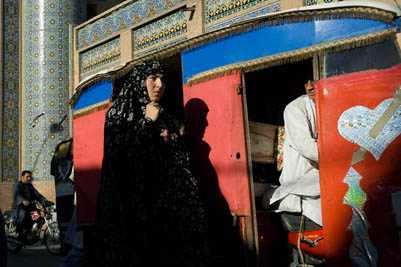 A woman walks in front of the Great Mosque in central Herat.Meanwhile, Bashir, now 40, has made the uncomfortable transition from symbol of hope to target. When she took office, a local mullah predicted she wouldn’t last a month. Now, after more than four years in office, Bashir has proven her detractors wrong—but at a tremendous personal cost. “Life is impossible,” Bashir says, “and every day is worse.” Telephoned death threats are routine. Threats against her family have forced her to home-school her two youngest children and send the oldest abroad. She describes her husband as “a very progressive man,” but his importation business in China means that she almost never sees him. In a city where the council of clerics has issued a fatwa against women leaving the home without an appropriate male escort, she began to feel alone and exposed. She requested around-the-clock security, but the government refused. She asked for a bulletproof car and was denied. Then, in 2007, her house was bombed.
A woman walks in front of the Great Mosque in central Herat.Meanwhile, Bashir, now 40, has made the uncomfortable transition from symbol of hope to target. When she took office, a local mullah predicted she wouldn’t last a month. Now, after more than four years in office, Bashir has proven her detractors wrong—but at a tremendous personal cost. “Life is impossible,” Bashir says, “and every day is worse.” Telephoned death threats are routine. Threats against her family have forced her to home-school her two youngest children and send the oldest abroad. She describes her husband as “a very progressive man,” but his importation business in China means that she almost never sees him. In a city where the council of clerics has issued a fatwa against women leaving the home without an appropriate male escort, she began to feel alone and exposed. She requested around-the-clock security, but the government refused. She asked for a bulletproof car and was denied. Then, in 2007, her house was bombed.
Now, as she leaves her office, Bashir’s clicking heels keep pace with the rolling gait of four armed guards—hired by the American government, not her own. Bashir and her guards jog down a winding circular staircase and burst through double doors. Slanted sunlight illuminates her face for an instant before she bends forward and slides across the backseat of an armored Land Cruiser. One bodyguard takes the wheel; another rides shotgun. The other pair follows in a second Land Cruiser, visible to Bashir’s driver on a dashboard screen wired to a rearview camera. Slivers of sunlight penetrate the black lace-shrouded windows, latticing Bashir’s face with fleeting snowflake patterns. No words are spoken.
A 16-YEAR-OLD GIRL I’ll call Shereen from Taliban-contested Helmand Province has been admitted to the hospital with burns covering 45 percent of her body. Cooking accident, she tells nurse Amini, but she smelled like gas when she was admitted.
“My feet are sore,” Shereen says, barely above a whisper, her eyes wide. Frayed braids of hair frame her sunken, jaundiced face. Feathers of burned skin hang from her cheeks and chin. She is draped in a filthy fleece blanket and antibiotic-stained sheets. A doctor stands beside Amini, who prepares a solution to clean her burns.
The doctor draws an X on her left arm where he wants a new IV needle inserted.
“You have gloves?” he asks Amini.
She nods, fills a tray with Betadine solution.
“Tell me your story again,” the doctor tells Shereen.
“My dress caught fire while I was cooking, and I tried rubbing it out with mud. I put water on it. I called my family.”
“I don’t believe you. I was on duty when you came in,” the doctor says, his voice calm but firm. “For the first day you couldn’t speak. Now you’re speaking. Tell me the truth.”
Shereen stays silent. She looks shamed.
Amini begins removing the bandages that swath the patient’s torso, arms, and legs. Cries from other wards drift down the vacant halls. Despite the antibiotic cream applied to her body, Shereen’s skin sticks to the unraveling bandages. She gasps, her voice rising and merging with other cries filling the ward.
“Allah!”
“Don’t cry,” Amini says. “We’re almost done.”
She finishes unraveling the bandages and applies a fresh layer of cream to the girl’s arms. Shereen’s body shudders, her eyes rolling. Amini’s face settles into a grim stare.
Amini wanted to be a nurse for as long as she can remember. When she was two years old, her father died. She and her mother moved in with an uncle. Another uncle, a doctor who practiced in London, helped support Amini and her mother, a nurse. Amini liked the smock her mother wore when she worked, the bright whiteness of it and the way it billowed as she walked.
When she was only 12, Amini’s Afghanistan uncle married her away to his 15-year-old son. Had he married his son to a girl outside the family, he would have had to pay a dowry. Amini, on the other hand, cost him nothing. Within a year Amini was pregnant, but the child died, as did the two that followed. Amini was 18 when her fourth child survived infancy. Today, that boy is 15. Her four other children are 13, 10, 7, and 5, plus two adopted children who were abandoned by their parents. Despite the demands of her family, Amini studied nursing in Kabul.
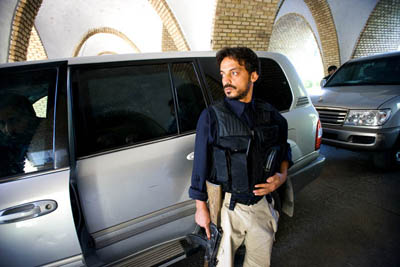 Bashir lives her life under constant guard.Amini’s husband married a second wife in 2002 but did not tell her until months later. He and his second wife have a five-year-old girl. Now Amini’s work as a nurse, once a source of independence, has become a trap. Her salary supports her own children and her husband’s second family. “I work day and night to have some money to make my children’s futures better,” Amini explains later. “As a mother I am just hoping for their futures.”
Bashir lives her life under constant guard.Amini’s husband married a second wife in 2002 but did not tell her until months later. He and his second wife have a five-year-old girl. Now Amini’s work as a nurse, once a source of independence, has become a trap. Her salary supports her own children and her husband’s second family. “I work day and night to have some money to make my children’s futures better,” Amini explains later. “As a mother I am just hoping for their futures.”
But Amini is silent now. She shares her story only with patients who admit to self-immolation, not girls who tell tales of accidents.
“Give her an injection to keep her quiet,” Amini tells the doctor.
BASHIR’S LAND CRUISER passes through quiet neighborhoods, past a man carrying multicolored balloons and women in burkas cradling babies. She stares straight ahead, the world passing outside her veiled window like a silent movie.
Her claustrophobic, bodyguard-ruled life limits her in ways she had never imagined. Before, she had enjoyed going out by herself, seeing friends, shopping and sharing tea. She usually wore only a hijab, but sometimes to escape her notoriety she would slip on a blue burka and walk to the bazaar. Soon, she found men recognized her voice. “How much is this?” she would ask a shopkeeper, and he would reply, “You are the prosecutor.” Every time, she wondered: Had he been to her office? Had she prosecuted him? She stopped going to the bazaar alone and settled into this new life, a captive to her security.
When she was young, Bashir’s father had told her that as the eldest child, her life was hers to make. On her exams for graduate school at Kabul University, Bashir was asked her top three choices for a course of study. She wrote “law” in all three blanks. After graduating in 1994, she took a position as a criminal investigator with the attorney general’s office in Kabul. She married and moved to Herat with her husband. Then the Taliban assumed power in the city in 1995. On the first day after the Taliban took over Herat, Bashir donned a burka and went to work, but the office was locked. The women were told, “You can no longer work in an office.”
Forced to stay home, she started an underground school for girls. Because the Taliban forbade girls from learning to read, they had to sneak to her building, their books concealed. Bashir knew the repressive regime couldn’t last forever, and when it fell, she wanted Afghanistan’s young women to be ready to rejoin society. She saw the 2001 American-led invasion as that chance. Girls returned to school, and Bashir went back to work as a criminal investigator. A few years later, Afghanistan’s attorney general visited Herat, and Bashir asked him whether he thought a woman could ever succeed as a chief prosecutor. Despite his reputation as a conservative, the attorney general said yes. And he gave her the job.
Bashir’s reputation as being incorruptible has put her at great risk. As has the fact that she takes up the cause of abused women. In one instance, a husband beat his pregnant wife’s feet so severely she could not put on her shoes. Another man struck his wife with a laundry iron. A third burned his wife with cigarettes. And then there are all the self-immolation cases. For all these women, Bashir endures the limitations imposed by her security detail, but the weariness shows.
One day in late 2007, Bashir’s daughter and youngest son were playing in the street. With the number of death threats increasing and the Herati Taliban resurgent—even the former mayor joined their cause—Bashir had three police officers assigned to protect her family at home. She started receiving calls: We know when your children leave for school. We will kidnap them if you do not leave your job. The police kept a restive watch, scanning the street for threats. The sky darkened and rain drove the children indoors.
Suddenly, the power went out. A blast shook the building. Inside, Bashir felt as if her body were pressed by an invisible crowd. Glass shattered, shards sweeping across the living room. Bashir’s children ran to the empty window frame. Her daughter covered her ears and screamed. Smoke rose from where two guards had been stationed. Both were severely injured. One would lose a leg. Bashir ran down the steps of her building, wielding a pistol, ready to confront her assailants. “I’m not scared of outlaws,” she told reporters who gathered the next day. It was only the rain that saved her children.
Bashir received a text message: “Resign or we can do worse.”
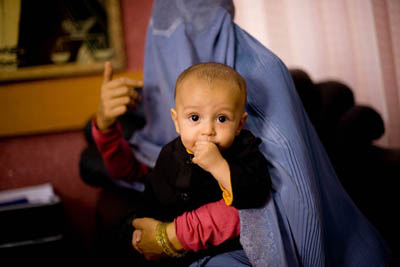 A young woman, on the run from abuse at the hands of her husband’s second wife and family, cries as she begs Bashir to take up her case.Over the next year and a half, Sitara Achakzai, the female secretary of the Kandahar Provincial Council, and Malalai Kakar, the top-ranking woman officer on the Kandahar police force, were gunned down outside their homes. Zarghuna Kakar, another member of the council, was attacked along with her family in a public bazaar—her husband shot and killed, one of her daughters wounded. In Herat, the son of another of Bashir’s bodyguards, mistaken for Bashir’s son, was kidnapped and murdered.
A young woman, on the run from abuse at the hands of her husband’s second wife and family, cries as she begs Bashir to take up her case.Over the next year and a half, Sitara Achakzai, the female secretary of the Kandahar Provincial Council, and Malalai Kakar, the top-ranking woman officer on the Kandahar police force, were gunned down outside their homes. Zarghuna Kakar, another member of the council, was attacked along with her family in a public bazaar—her husband shot and killed, one of her daughters wounded. In Herat, the son of another of Bashir’s bodyguards, mistaken for Bashir’s son, was kidnapped and murdered.
Now, Bashir home-schools her 11-year-old son Sajad and 14-year-old daughter Yasaman; an older son has been sent to Europe. Every morning, Yasaman gets up with her mother and helps prepare breakfast. Then she cleans the house, does her homework, and waits with Sajad for their teacher. The day we visit, they are wearing hoodies and T-shirts—you have to look close to realize they’re probably Chinese knockoffs and not goods from the Gap or Old Navy. After Sajad finishes his homework, he watches TV and complains to his sister of being bored. When Sajad sees boys his age, he wishes he could go out and play like them. Because he can’t go out, he doesn’t have friends. A sad-eyed boy, he is shy among guests. He would like to be a lawyer like his mom, or a pilot, when he grows up.
Their teacher comes for a few hours a day, six days a week. Her family did not want her to teach Bashir’s children. They worried she would be harmed by the people who set the bomb. The teacher insisted. If Allah had determined that she was to die teaching Bashir’s children, then that was her fate.
Yasaman knows the schedule of a nearby girls’ school. She has written down the time they get out so she can look out the window when class is dismissed. After they pass, she stays by the window and waits for her mother. Yasaman often wishes her mother had a different job. “But I know that she is helping people—especially women—to have their rights. Her job is good for the people, just not for us.”
AT THE BURN UNIT’S Tuesday morning staff meeting, a doctor reads the names of patients, including the severely burned woman who died at 1:30 a.m. Amini knew she wouldn’t last long. Shereen, on the other hand, appears to be improving. Two other patients are well enough to have skin grafts. Another will be released.
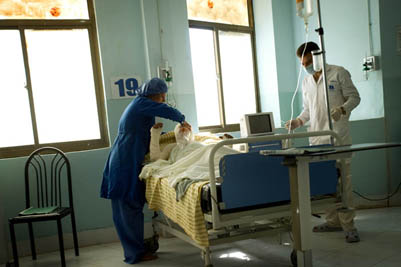 A nurse and a relative attend to a self-immolation case—a young woman who died the next day.It seems a miracle that anyone recovers here. Staff often pay for supplies out of their own pockets: scissors, bandages, antibiotics. They wear threadbare smocks all day, then toss them on top of their lockers to wear, rumpled and unwashed, the next day. They wear cracked plastic sandals that have never been sterilized and walk on damp floors stained with mop water. The peeling walls and ceilings drift plaster dust. Some doctors don surgical masks when they work with patients. Many do not.
A nurse and a relative attend to a self-immolation case—a young woman who died the next day.It seems a miracle that anyone recovers here. Staff often pay for supplies out of their own pockets: scissors, bandages, antibiotics. They wear threadbare smocks all day, then toss them on top of their lockers to wear, rumpled and unwashed, the next day. They wear cracked plastic sandals that have never been sterilized and walk on damp floors stained with mop water. The peeling walls and ceilings drift plaster dust. Some doctors don surgical masks when they work with patients. Many do not.
After the meeting, Amini stops by Shereen’s bed. Shereen complains that her married brother criticizes her too much. Her unmarried brothers harass her too, but her older married brother’s jibes sting more. “Why don’t you criticize your wife?” she asks him. “Why am I never good enough for you?”
The burns on Shereen’s face have healed, leaving only barely discernible scars. In three weeks, she should be well enough for skin grafts on her chest and legs. In time, she will return to her village in Helmand. “Her family will again force her to stay home and keep her from going to school,” Amini says later. She will have no future. Her life will be up to the village elders.
But Amini does not dwell on outcomes she cannot affect. She walks to the women’s locker room and shrugs off her smock.
EACH NIGHT, as Bashir rides home to her children, her exhausted mind circles back to the cases she’s heard.
Today, one complainant sat in a chair beside her desk and spoke in a high, muffled, desperate voice through the screen of her burka, a bright-eyed baby straddling her hip. She had come to see Bashir all the way from the Ghoryan district, west of Herat near the Iranian border. She said she was the first wife of her husband. The second wife and her brother had been beating her and hurting her infant son, and her husband would do nothing to stop them. She went to the police with blood still on her face. The police arrested the brother but soon released him. The beatings did not stop. She’s on the run.
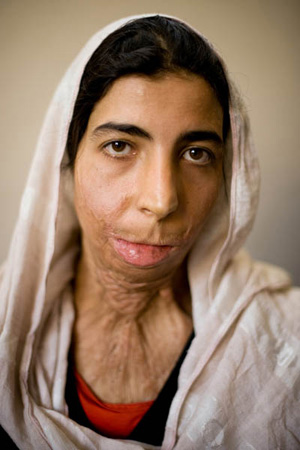 Zahra, 20, burned herself with fuel at age 15 to protest her forced marriage.“They will kill me if I go back to the district police,” she said.
Zahra, 20, burned herself with fuel at age 15 to protest her forced marriage.“They will kill me if I go back to the district police,” she said.
“I will write a letter to have your case transferred to my office,” Bashir said.
“Just kill me now before they do,” the woman said.
Bashir called the prosecutor in the Ghoryan district. She instructed him to transfer the case to her office. Don’t investigate from the district level, she said.
“I will need,” she said firmly, “your cooperation.”
Bashir hung up and again assured the woman she would handle the case. The woman nodded, crying beneath her heavy turquoise veil.
Tears rimmed Bashir’s eyes as the woman left her office. “If men marry more than one wife,” she said, “but don’t treat them equally, they would be better off marrying just one. But they don’t think that way. They read the Koran and only see they can have more than one wife. They don’t think.”
A young girl—maybe 13 or 14—entered her office, passed the flatscreen TV featuring a jovial cooking-show host, and sat in the chair and talked about how a schoolboy had threatened her for refusing to marry him.
Bashir wiped her eyes and nodded.
BASHIR TELLS her children good night. In these lonely hours, as quiet settles over Herat, she worries for their futures. “Because of my work, my children don’t have the freedom that other children have,” she says. “That is the thing I am always feeling guilty about.” She hopes it is not for nothing.
“When Yasaman grows up, I hope she will not face the hardships I faced,” she says. “I hope she can become an independent woman, protected by the law, and can live and work freely and happily.”
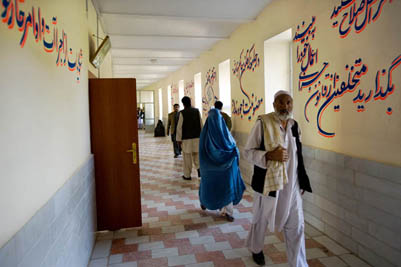 Reminders about the letter of the law are painted on the corridor outside Maria Bashir’s office.The new laws and the Family Response Unit have encouraged more and more women to file complaints against abusive husbands and families. There are more cases for Bashir to prosecute, and she measures progress case by case. But she is free of illusions. Police bureaucracy and the corrupt court system can be daunting for even the most educated Afghan women, and the war against the Taliban is far from over.
Reminders about the letter of the law are painted on the corridor outside Maria Bashir’s office.The new laws and the Family Response Unit have encouraged more and more women to file complaints against abusive husbands and families. There are more cases for Bashir to prosecute, and she measures progress case by case. But she is free of illusions. Police bureaucracy and the corrupt court system can be daunting for even the most educated Afghan women, and the war against the Taliban is far from over.
“I hope that Afghanistan will have a better future,” Bashir says, “but I know it won’t come soon. It may take another generation. Or two. Maybe my daughter’s daughter will have a good life.”
















